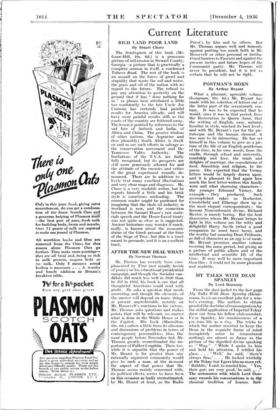Current Literature
The frontispiece of this book (Mc- Graw-Hill, 10s. 6d.) is a gruesome picture of soil erosion in Stewart County, Georgia—a picture that is practically a complete sermon in itself, a condensed Tobacco Road. The rest of the book is an assault on the forces of greed and stupidity that waste the soil and water, the grass and oil of the nation with no regard to the future. The refusal to pay any attention to posterity on the ground that it has " done nothing for us " (a phrase here attributed a little too confidently to the late Uncle Joe Cannon) has certainly had painful results for America already. and will have more painful results still, as the assets of the country are frittered away. The lesson is pointed by references to the sad fate of Antioch and India, of Africa and China. The greater wisdom of other nations, the Argentine and (less plausibly) South Africa is dwelt on and so are such efforts in salvage as the conservation movement and the Tennessee Valley Authority. The limitations of the T.V.A. are fairly fully recognised, but its prospects are still more generously allowed for and the attitude of the enemies and critics of the great, experiment roundly de- nounced. There are in addition to a lively text many excellent illustrations and very clear maps and diagrams. Mr. Chase is a very readable writer, but he repeats himself a little and his brisk style is sometimes misleading. The common reader might be pardoned for imagining that the shale oil industry in Scotland is new, and the connexion between Sir Samuel Hoare's raw mate- rials speech and the Hoare-Laval treaty was not quite as close as is suggested. Ancient historians may wonder if much, really, is known about the economic status of the Greek peasant at the time of the Siege of Troy, but this is a tract meant to persuade, and it is an excellent tract.




















































 Previous page
Previous page